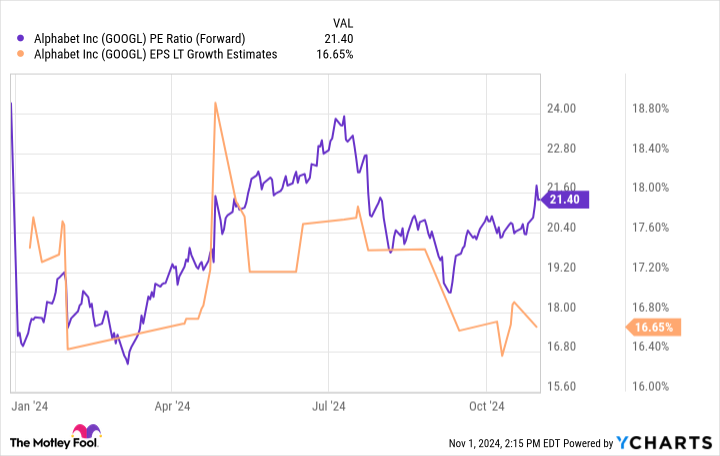Third-quarter earnings reminded Wall Street there is so much more to Alphabet than its Google brand.
Google’s years-long run as the world’s dominant internet search engine has turned Alphabet (GOOG -1.14%) (GOOGL -1.20%) into a technology juggernaut worth over $2 trillion today. The stock has returned over 6,700% since its initial public offering (IPO) about 20 years ago, easily outpacing the S&P 500‘s 680%.
Companies grow up, mature, and then slow down. Sometimes, they even die off. In that light, it’s fair to wonder whether Alphabet can still help investors build the generational wealth needed for a comfortable retirement.
One quarter doesn’t generally make or break a company, but Alphabet showed plenty of evidence in its third-quarter earnings that the stock can still help investors retire as millionaires. Let’s look a bit closer at the quarterly results and outline why investors looking to retire wealthy should consider including Alphabet in their investment plans.
The cloud might be Alphabet’s next big cash cow
Alphabet’s cloud performance was arguably the highlight of the company’s quarter. Alphabet and others are jockeying for artificial intelligence (AI) positioning, which is currently showing up primarily in cloud revenue because companies are deploying AI applications through the cloud.
Google Cloud posted $11.3 billion in revenue in Q3, a 35% increase from last year. This is a notable uptick in growth; Google Cloud grew 29% last quarter and 28% in Q1. More importantly, Google Cloud is becoming increasingly profitable. The segment’s operating income in Q3 was $1.9 billion versus just $266 million a year ago.
It’s hard to call Alphabet an underdog in anything, even in the cloud. Alphabet is the world’s third-largest provider behind Amazon and Microsoft. But this growth momentum is excellent news for the future as it signals market share gains. For the record, Amazon’s cloud revenue grew 19%, while Microsoft’s Azure grew 33% in their most recent quarters.
Google Cloud seems poised to become a future cash cow for a business already generating $50 billion to $80 billion in annual free cash flow. The rich get richer in the technology sector.
Continued advertising strength
It’s boring, but Alphabet’s digital ads business still pays the bills. Alphabet operates Google and YouTube, the world’s two most trafficked websites by a wide margin. Digital ads totaled about $58 billion in Q3 alone. Remarkably, these legacy businesses are still growing. Google Search and YouTube grew their ad revenue by roughly 12% year over year in Q3.
The most significant concern facing Alphabet’s ad business is this year’s ruling that Alphabet engaged in anticompetitive practices, which stemmed from an antitrust lawsuit brought against it by the U.S. Department of Justice. It remains to be seen what fines or regulations are put in place to thwart Alphabet. It’s not a reason to panic right now, but it’s something to watch as it develops over the coming quarters.
Two long-term growth catalysts worth remembering
Digital ads and cloud growth are the primary growth engines behind Alphabet today, but it’s worth looking further out to see what’s bubbling under the surface. If you’re going to hold Alphabet for the long term, the company may need to capitalize on other opportunities to generate the investment outcomes you’re looking for.
Fortunately, Alphabet has its hands in various pots, two of which are especially interesting.
First is Alphabet’s sneaky upside in autonomous driving. Tesla gets a ton of publicity for its autonomous driving goals, but Waymo, a subsidiary of Alphabet dedicated to autonomous driving, has made tremendous strides. During its Q3 earnings call, Alphabet announced that Waymo now delivers 150,000 paid rides and drives over a million autonomous miles weekly.
Second is Alphabet’s emerging leadership in streaming. Its service, YouTube TV, has an estimated 44% of the market for digital pay television in the U.S., with Walt Disney‘s Hulu Live coming in second at 27%. Like the shift from brick-and-mortar retail to online shopping, media viewership has steadily shifted from broadcast television to digital providers. Alphabet is positioned to monetize streaming via both subscriptions and ads.
These two opportunities could contribute more to the company as they develop and grow.
A technology powerhouse at an attractive price today
All of Alphabet’s pieces combine to form a business that analysts estimate will grow earnings by an average of almost 17% annually over the long term. You might expect a dominant company such as Alphabet to command a hefty price in this market, especially considering how expensive it is.
However, Alphabet trades at just 21 times its forward earnings estimates today. That’s a PEG ratio of just 1.3, which investors should happily pay for a technology heavyweight with the AI upside of Alphabet.
GOOGL PE Ratio (Forward) data by YCharts
Alphabet is a rare stock in this market with an opportunity and valuation that are both compelling. The stock can help investors retire rich, and it’s a table-pounding buy today.
John Mackey, former CEO of Whole Foods Market, an Amazon subsidiary, is a member of The Motley Fool’s board of directors. Suzanne Frey, an executive at Alphabet, is a member of The Motley Fool’s board of directors. Justin Pope has no position in any of the stocks mentioned. The Motley Fool has positions in and recommends Alphabet, Amazon, Microsoft, Tesla, and Walt Disney. The Motley Fool recommends the following options: long January 2026 $395 calls on Microsoft and short January 2026 $405 calls on Microsoft. The Motley Fool has a disclosure policy.










